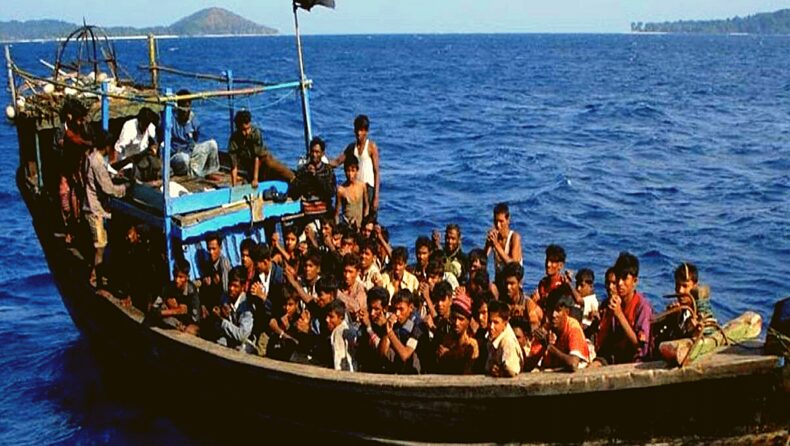Rohingya are drowning in the sea. It is both immoral and illegal for Asian leaders not to help the community.
Table of Contents
In early January, a boat with 185 Rohingya refugees washed ashore on the coast of Aceh, a province in Indonesia. After spending months in cramped and overcrowded conditions in the camps in Bangladesh, the refugees in a desperate attempt to search for a life of dignity went to sail in the sea. Sadly, their boats were stranded in the middle of the Andaman sea with no access to food and drinking water.
Few reports came in as some of them had been spotted in boats by natives, despaired, emaciated and nothing but anguish on their faces.
More than half were women and children.
According to the UN High Commissioner for Refugees (UNHCR), thousands of Rohingyas, including women and children, took arduous boat journeys to the sea in 2022.
Sadly, since November last year, three more boats carrying hundreds of women and children taking similar perilous journeys have landed on the shore of Aceh.

More often local fishermen, driven by compassion for desperate refugees have taken it upon themselves to rescue boats stranded in the Andaman Sea.
“As a Rohingya who worked to stop genocide against my people, I could not have been more grateful to the braveness and selfness of the Acehnese,” said a refugee.
It is even more deplorable that common people have to step in to do what governments in the region are supposed to do. For years India and Indonesia, states in South and Southeast Asia have been ignorant of the plight of Rohingya “moving in boats”, refusing them to land on their shores and even helping them to push their vessels back to sea.
Refusing a chance to allow the migrants on their lands and sending them back to a place where they are at risk of serious human rights violations. “This is illegal- a serious violation of the non-refoulment principle under International law,” said a migrant.
It is also immoral for regional states and must change their course of action immediately to prevent more lives from being lost in the sea.
A life in exile
The Rohingya people have risked their lives by moving from Myanmar in boats to escape the genocide in the native Rakhine state. Thousands of refugees, mostly from Bangladesh, have taken dangerous boat journeys into the sea.

Nearly a million Rohingya refugees live in camps in Bangladesh.
While it has been generous for the Bangladesh government to offer a safe haven to those fleeing, the camps are more often cramped and overcrowded. The Rohingyas have almost no access to education or decent job. A boat journey was the last desperate attempt to build a life of dignity.
The Asian “boat crisis”
Back in 2015, the Asian “boat crisis” made global headlines, as hundreds of refugees went missing and lost their lives at sea when the governments investigated the human trafficking networks.

Image source: BBC
In 2022, the number has picked up again in recent years. The UNHCR in recent years estimated, at least 1,920 Rohingya took to boats- a sharp increase in 2021.
At least 119 people went missing in the sea on a boat journey last year, According to reports further, 180 people are presumed to be dead after their boats went missing in December last year.
Survivors have described the conditions on boats as horrendous, those who went on the boats were stranded on boats with no access to food, drinking water, or medicine for several months.
Many have been targets for human trafficking, being smuggled to other countries as labourers, Furthermore the refugees were charged in the name of life savings for deck space.
Tolling deaths, a wake-up call for ASEAN
Although the members of the Association of Southeast Asian Nations (ASEAN) and other regional governments have vowed not to desert refugees at sea, many of them have sealed their borders including Thailand, India, Malaysia, and Indonesia.

At times they provide food supplies and medical care, only to later push them back into the sea.
The harrowing tales of the survivors and the rising toll of deaths should serve as a wake-up call for the regional states. ASEAN should step in and take collective measures along with its member states to direct maritime search operations and focus on fleeing refugees and rescue them. It should be the collective responsibility of the states across borders to allow the persecuted refugees to grant entry, giving them the medical care they need, while respecting their right to seek asylum.
Bali Process is an international mechanism set up in 2002 to coordinate and take action on human trafficking and maritime crimes. All the 10 members of ASEAN as well as South Asian states like India are a part of the Bali Process.
In 2016, all the member states have adopted the Bali Declaration mandate. After witnessing the horrendous stories of the boat survivors in the “boat crisis”. Its members have pledged to coordinate and find legal pathways to rescue the refugees. However, this was nothing more than a paper promise.
At this moment, many regional countries are turning a blind eye to the root cause of the crisis. Moreover the treatment of the Rohingya in their own country, Myanmar.
Read More: Flipkart’s ₹122 billion stake sale could see Accel and Tiger Global leave












